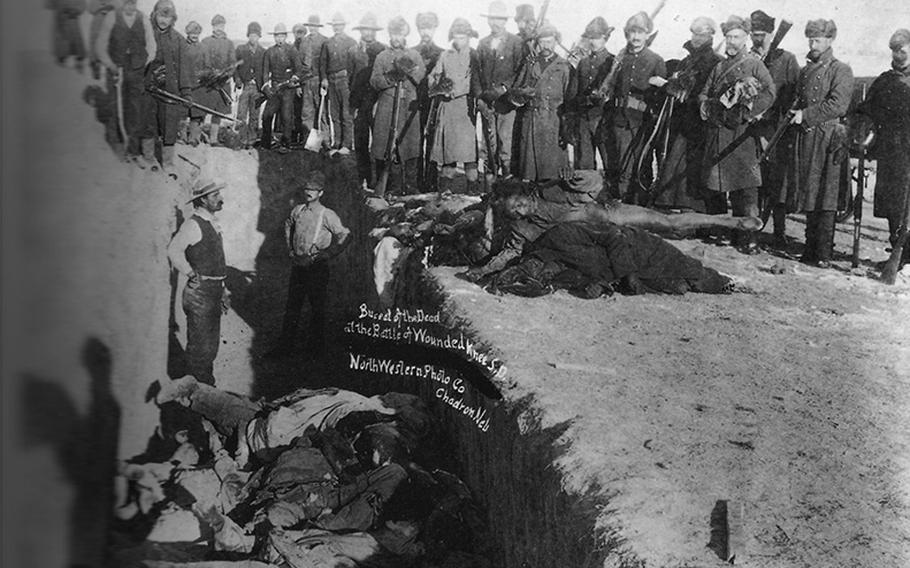
This undated photo shows the dead being buried in a common grave at Wounded Knee, S.D., in the aftermath of the Dec. 29, 1890, Battle of Wounded Knee. (Library of Congress)
Defense Secretary Lloyd Austin has ordered a review of 20 Medals of Honor given to U.S. soldiers for their actions during the 1890 Battle of Wounded Knee, which later became known as a massacre of Native Americans, to make certain the awards were warranted.
The reassessment — requested by Congress in 2022 — will be completed by a five-person panel of experts charged with examining each individual recipient’s actions during the incident at Wounded Knee Creek in South Dakota, Austin wrote in a July 19 memorandum. He ordered the panel to provide a recommendation to retain or rescind each individual Medal of Honor by Oct. 15.
“The scope of the [panel’s] review is limited to reviewing each [Wounded Knee Creek Medal of Honor] awardee’s individual actions during this specific engagement on or about Dec. 29, 1890,” Austin wrote in the memo made public Wednesday. The panel “may consider the context of the overall engagement as appropriate, including as necessary to understand each … recipient’s individual actions.”
Austin issued the memo after consulting with the White House and Interior Department. Only the president can order a Medal of Honor rescinded.
The Wounded Knee massacre saw soldiers from the Army’s 7th Cavalry kill or injure some 350 to 375 Lakota — mostly unarmed men, women and children, according to federal government estimates.
Manny Iron Hawk of the Cheyenne River Sioux Tribe speaks at a Capitol Hill news conference about the Remove the Stain Act in 2019. Rep. Denny Heck, D-Wash., left, and Oliver “OJ” Semans, a Navy veteran and member of the Rosebud Sioux Tribe, are behind him. Marcella LeBeau, a member of the Cheyenne River Sioux Tribe, is also pictured. The bill called for the Medals of Honor awarded to soldiers involved in the 1890 Wounded Knee Massacre to be rescinded. (Stars and Stripes)
In the incident, the 7th Cavalry surrounded a group of Lakota led by Chief Big Foot to confiscate firearms after the chief had agreed to surrender them peacefully, according to the Britannica historians. When a Lakota tribesman declined to give up a weapon, a soldier attempted to grab it, and it fired. After the weapon went off, U.S. soldiers opened fire on the Lakota. Almost half those killed were women and children. Some 25 U.S. soldiers also died in the incident, “many likely fallen to friendly fire,” the historians wrote.
In the months after the massacre, the Army awarded 18 Medals of Honor to soldiers in the ranks of private to captain, according to service records. The citations justifying the medals ranged greatly.
One included just a single word: “Bravery.” Another went into more detail: “Went to rescue of the commanding officer who had fallen severely wounded, picked him up and carried him out of range of the hostile guns.”
Two more Medals of Honor for the incident were issued years later, one in 1893, and another in 1897, records show.
The review is not the first look at rescinding Medals of Honor, according to the Defense Department. A 1916 review led to the rescinding of more than 900 Medals of Honor, according to the department.
The review will consider the lower standards for the Medal of Honor prescribed at the time of the incident, decades before other top valor medals — including the Bronze Star, Silver Star and the Distinguished Service Cross — were established, according to defense officials.
The review also comes after the South Dakota Senate earlier this year passed a resolution seeking an official inquiry into those Medals of Honor from the Wounded Knee massacre.
“It’s never too late to do what’s right,” an unnamed senior defense official said of the review in a DOD statement.